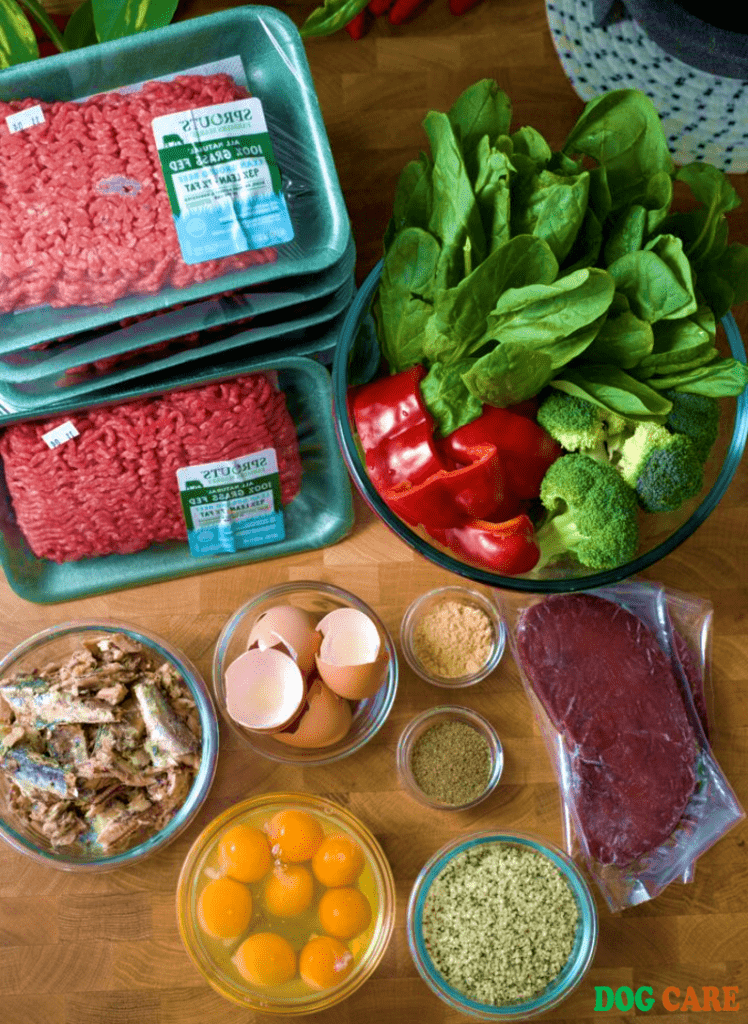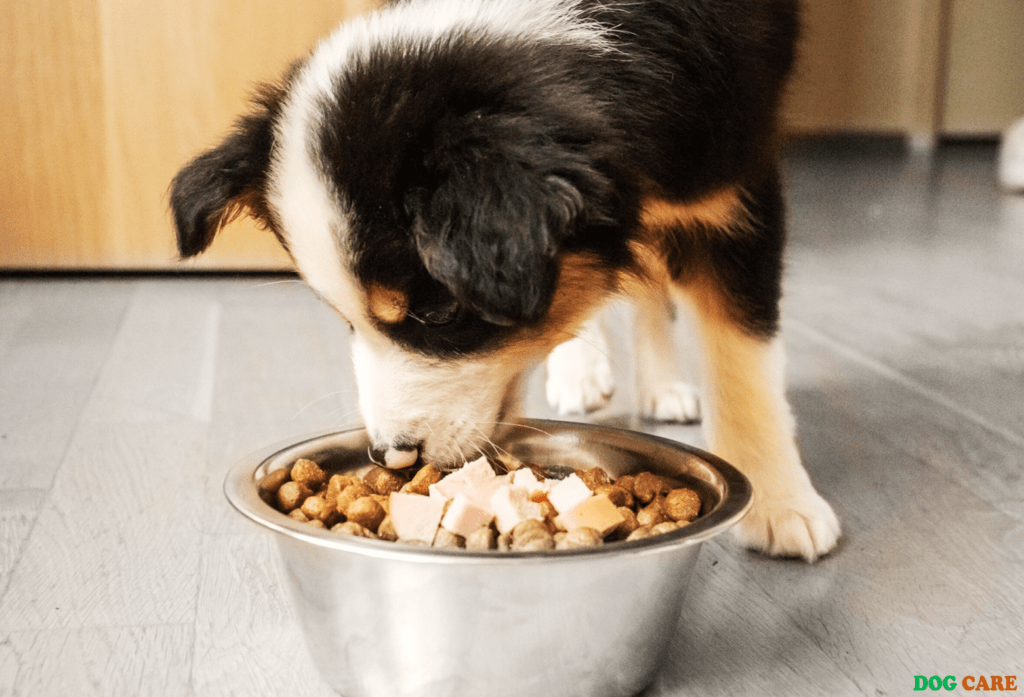Best Human Food for Dogs With Skin Allergies : The best human food for dogs with skin allergies includes lean proteins like turkey and salmon, antioxidants-rich fruits like blueberries, and omega-3 fatty acids found in fish oil. If your dog suffers from skin allergies, finding the right diet can be crucial in managing their symptoms.
While commercial dog food may not always provide the necessary nutrients, incorporating certain human foods into their diet can help alleviate their discomfort. Lean proteins like turkey and salmon provide essential amino acids that promote healthy skin and coat. Antioxidant-rich fruits like blueberries can reduce inflammation and support the immune system.
Omega-3 fatty acids, found in fish oil, help maintain skin barrier function and reduce itching. By incorporating these human foods into your dog’s diet, you can help improve their skin health and overall well-being.
Understanding Skin Allergies In Dogs
Dogs, just like humans, can suffer from various allergies, and one of the most common types is skin allergies. Skin allergies in dogs can be frustrating and uncomfortable for both the pet and the owner. It is essential to understand the causes, signs, and symptoms of these allergies to provide the best care and relief for your furry friend.
Common Causes Of Skin Allergies In Dogs
There are several common causes of skin allergies in dogs that every pet owner should be aware of:
| Allergen | Description |
|---|---|
| Flea bites | Flea saliva can trigger an allergic reaction in sensitive dogs. |
| Pollen | Pollen from grasses, weeds, or trees can cause seasonal allergies in dogs. |
| Dust mites | Microscopic organisms found in house dust can lead to skin irritation. |
| Mold spores | Molds growing in damp environments can cause allergic reactions in dogs. |
| Food ingredients | Certain dog food ingredients, such as beef, chicken, wheat, or dairy, can trigger allergic responses. |
Identifying the specific allergen can be challenging, but with the help of an experienced veterinarian, you can perform tests or undergo an elimination diet to determine what is causing your dog’s skin allergies.
Signs And Symptoms Of Skin Allergies In Dogs
Dogs with skin allergies may exhibit various signs and symptoms:
- Excessive scratching: Your dog may scratch repeatedly, leading to redness, irritation, and even open sores on their skin.
- Chewing and licking: Allergies can cause dogs to chew or lick certain areas of their body, such as paws or belly.
- Hair loss: Constant itching and scratching can result in hair loss or thinning of the coat.
- Ear infections: Some dogs with skin allergies may develop recurring ear infections.
- Red and inflamed skin: Allergic reactions can cause the skin to become red, inflamed, and even develop rashes or hives.
If you notice any of these signs in your furry companion, it is crucial to seek veterinary attention for a proper diagnosis and treatment plan.
Powerful Natural Remedies For Dogs With Skin Allergies
Powerful Natural Remedies for Dogs with Skin Allergies
If you have a furry friend who suffers from skin allergies, you know how distressing it can be to see them constantly scratching, biting, or rubbing their skin. Skin allergies in dogs can be caused by various factors, including environmental allergens, food sensitivities, or genetic predispositions. While it’s crucial to consult with your veterinarian for a proper diagnosis and treatment plan, there are several natural remedies that you can incorporate into your dog’s routine to alleviate their discomfort and promote healthier skin. Here are 10 powerful natural remedies for dogs with skin allergies.
Incorporating Omega-3 Fatty Acids In Their Diet
Omega-3 fatty acids are essential for skin health in dogs. These healthy fats help reduce inflammation and itchiness associated with allergies, promoting a healthier skin barrier. You can incorporate omega-3 fatty acids into your dog’s diet by feeding them high-quality fish oil supplements or including fatty fish like salmon or sardines in their meals. A regular intake of omega-3 fatty acids can help reduce the severity and frequency of allergic reactions in your dog.
Beneficial Effects Of Coconut Oil
Coconut oil is a versatile natural remedy that can benefit dogs with skin allergies. It contains lauric acid, which possesses antiviral, antibacterial, and antifungal properties. Applying coconut oil topically can help soothe irritated skin, moisturize dry patches, and promote healing. Additionally, incorporating coconut oil into your dog’s diet can support their immune system and reduce inflammation from within.
Adding Probiotics To Improve Gut Health
A healthy gut is crucial for overall well-being, including skin health. Probiotics are beneficial bacteria that help maintain a balanced gut flora, improving digestion and nutrient absorption. By incorporating probiotics into your dog’s diet, you can support their immune system and reduce the risk of allergic reactions. Yogurt and kefir are natural sources of probiotics that you can safely include in your dog’s diet.
Role Of Quercetin In Reducing Allergic Reactions
Quercetin is a natural flavonoid with strong antioxidant properties. It helps inhibit the release of histamines, which are responsible for triggering allergic reactions and causing itchiness. By reducing histamine release, quercetin can help alleviate the symptoms of skin allergies in dogs. You can find quercetin in various fruits and vegetables, such as apples, berries, and leafy greens. Consult your veterinarian for the appropriate dosage and form of supplementation.
Turmeric: A Natural Anti-inflammatory Agent
Turmeric, a vibrant yellow spice, contains a compound called curcumin, which has potent anti-inflammatory properties. Adding turmeric to your dog’s diet can help reduce inflammation associated with skin allergies, providing relief from itchiness and redness. You can sprinkle a small amount of turmeric powder onto their food or look for pet-specific turmeric supplements that are formulated with the appropriate dosage for dogs.
Aloe Vera’s Soothing Properties
Aloe vera has long been known for its soothing properties on the skin. Applied topically, aloe vera gel can alleviate itchiness, reduce redness, and promote the healing of irritated skin in dogs. Make sure to use pure aloe vera gel without any added chemicals or preservatives. Gently massage the gel onto the affected areas of your dog’s skin for relief.
Chamomile’s Calming Effects On Irritated Skin
Chamomile is a gentle herb that offers soothing and calming effects for dogs with skin allergies. You can prepare a chamomile tea rinse by steeping chamomile flowers in hot water, allowing it to cool, and then pouring it over your dog’s affected areas. This natural remedy can help reduce inflammation and soothe irritated skin, providing relief from itchiness.
Healing Effects Of Colloidal Oatmeal
Colloidal oatmeal is finely ground oats that have been processed into a powder for easy use. It possesses remarkable healing properties for dogs with skin allergies. When added to a warm bath, colloidal oatmeal forms a protective film on the skin, providing relief from itching, soothing inflammation, and promoting healing. After bathing your dog, gently pat them dry, ensuring they do not lick off any residual oatmeal.
Calendula: A Natural Antiseptic
Calendula, also known as marigold, is a powerful natural antiseptic that can help prevent infection on your dog’s irritated skin. You can apply calendula cream or oil topically to wounds, cuts, or hotspots caused by allergic reactions. The antiseptic and anti-inflammatory properties of calendula can support the healing process and reduce further discomfort.
Nettle Leaf’s Antihistamine Properties
Nettle leaf contains natural antihistamines that can help alleviate the symptoms of dog skin allergies. It can reduce inflammation, suppress histamine release, and provide relief from itching. Incorporating nettle leaf into your dog’s diet can be beneficial in managing their allergic reactions. Consult your veterinarian for the appropriate dosage and form of nettle leaf supplementation.
Preparing Homemade Meals For Dogs With Skin Allergies
When it comes to helping your dog with skin allergies, preparing homemade meals can be a great step towards improving their overall health and well-being. By choosing the right ingredients and ensuring a balanced diet, you can provide your furry friend with the relief they need. Here are some important considerations to keep in mind while preparing homemade meals for dogs with skin allergies.
1. Choosing High-quality Protein Sources
A key component of a skin-friendly diet is high-quality protein sources. Opting for lean meats such as chicken, turkey, or fish can provide essential amino acids and help in repairing and maintaining healthy skin and coat. Proteins are vital for proper cell regeneration, which is crucial for dogs with skin allergies. If your dog has specific protein sensitivities, it is advisable to consult with your veterinarian to identify suitable alternatives.
2. Including Beneficial Vegetables And Fruits
Variety is crucial when it comes to including vegetables and fruits in your dog’s diet. These foods are packed with essential vitamins, minerals, and antioxidants that can help strengthen their immune system and maintain healthy skin. Colorful options like carrots, sweet potatoes, and blueberries can provide a wide range of nutrients, while leafy greens like spinach and kale can add beneficial vitamins like A, C, and K. Ensure to cook or puree the vegetables properly for easy digestion and absorption of nutrients.
3. Avoiding Common Allergenic Ingredients
When preparing meals for dogs with skin allergies, it is important to avoid common allergenic ingredients that could exacerbate their condition. Some ingredients to steer clear of include wheat, corn, soy, and dairy products. These have been known to trigger allergic reactions in dogs and contribute to skin inflammation. Instead, opt for alternative grains like rice or quinoa for carbohydrates and consider lactose-free options if your dog enjoys dairy treats.
In conclusion, preparing homemade meals for dogs with skin allergies requires a well-thought-out approach. By choosing high-quality protein sources, including beneficial vegetables and fruits, and avoiding common allergenic ingredients, you can provide your four-legged companion with a nutritious and skin-friendly diet that promotes their overall well-being. Remember, it’s always best to consult with a veterinarian or a professional canine nutritionist to ensure you are meeting your dog’s specific dietary needs.

Supplementing The Diet For Optimal Skin Health
When it comes to dogs with skin allergies, a balanced diet is crucial for their overall health and well-being. However, some dogs may require additional support to address their specific skin issues. Supplementing their diet with the right nutrients can help alleviate their skin allergies and promote optimal skin health.
Introduction To Supplements For Dogs With Skin Allergies
Supplements play a vital role in supporting dogs with skin allergies. These specialized additives contain essential nutrients that can strengthen the immune system, reduce inflammation, and promote healthy skin regeneration. By incorporating these supplements into their daily diet, dog owners can provide the necessary nutritional support to help combat skin sensitivities and promote a lustrous coat.
Essential Nutrients For Healthy Skin
Achieving healthy skin for dogs with allergies requires a balance of essential nutrients. These nutrients help maintain the skin’s protective barrier, support cell regeneration, and reduce inflammation. Some of the key nutrients that contribute to optimal skin health include:
| Nutrient | Benefits | Sources |
|---|---|---|
| Omega-3 Fatty Acids | Promote healthy skin, reduce inflammation, and boost immunity. | Fish oil, flaxseed oil, salmon |
| Vitamin E | Acts as an antioxidant, protects skin cells from damage. | Almonds, sunflower seeds, spinach |
| Vitamin A | Aids in skin cell regeneration and maintains a healthy coat. | Carrots, sweet potatoes, liver |
Recommended Supplements For Dogs With Skin Allergies
When it comes to choosing supplements for dogs with skin allergies, it’s essential to select those that are specifically formulated to address their unique needs. Here are some top recommendations:
- Omega-3 Fish Oil: Rich in omega-3 fatty acids, this supplement soothes inflammation, supports a healthy coat, and strengthens the immune system.
- Probiotics: These beneficial bacteria aid in digestion and boost the immune system, helping to alleviate allergic reactions that may manifest on the skin.
- Vitamin E Supplements: Known for their antioxidant properties, vitamin E supplements can help protect the skin from damage caused by free radicals.
- Quercetin: Natural antihistamine properties of quercetin can help reduce itching, inflammation, and skin allergies in dogs.
It’s important to consult with a veterinarian before introducing any new supplements to your dog’s diet. They can provide guidance on dosage, potential interactions, and ensure the selected supplements are safe and appropriate for your dog’s specific needs.
Other Lifestyle Changes To Support Dogs With Skin Allergies
Dogs with skin allergies require not only a specialized diet but also a few lifestyle changes to alleviate their symptoms and enhance their overall well-being. These changes are geared towards minimizing exposure to environmental allergens, maintaining proper hygiene through regular bathing and grooming practices, and using hypoallergenic dog products. By incorporating these lifestyle adjustments into your dog’s routine, you can provide them with the support they need to manage their skin allergies effectively.
1. Minimize Exposure To Environmental Allergens
Reducing your dog’s exposure to environmental allergens is crucial in managing their skin allergies. These allergens can include pollen, dust mites, mold spores, and certain types of grass. Here are a few ways you can minimize their exposure:
- Avoid walking your dog during peak pollen periods, typically in the early morning and late afternoon.
- Create a designated area for your dog to relieve themselves that is free from allergy triggers such as grass or flowers.
- Regularly clean and vacuum your home to eliminate dust mites and other potential allergens.
- Consider using air purifiers with HEPA filters to improve the air quality in your home.
- Wash your dog’s bedding regularly using hypoallergenic detergent and avoid using fabric softeners that can contain irritating chemicals.
2. Regular Bathing And Grooming Practices
Proper hygiene practices are essential to manage skin allergies in dogs. Regular bathing and grooming help remove allergens and soothe irritated skin. Follow these tips for effective bathing and grooming:
- Use a mild, hypoallergenic dog shampoo specifically formulated for sensitive skin.
- Gently massage the shampoo into your dog’s fur, focusing on areas prone to allergies.
- Rinse thoroughly to ensure the removal of all shampoo residues.
- Dry your dog with a clean towel, avoiding harsh rubbing that may further irritate their skin.
- Brush your dog’s coat regularly to remove loose fur and prevent matting.
- If necessary, trim your dog’s hair to minimize the accumulation of allergens.
3. Using Hypoallergenic Dog Products
Choosing hypoallergenic dog products is another important aspect of managing skin allergies. These products are specially designed to minimize allergic reactions and irritations. Consider the following items when selecting hypoallergenic options:
- Food: Opt for hypoallergenic dog food that is free from common allergens such as grains, dairy, and artificial additives.
- Treats: Look for hypoallergenic treats that are made with limited ingredients and are free from potential allergens.
- Toys: Select toys made from natural materials or labeled as hypoallergenic to reduce the risk of triggering allergies.
- Bedding: Provide your dog with hypoallergenic bedding that is easy to clean and resistant to allergen buildup.
- Cleaning Products: Use hypoallergenic cleaning products to maintain a allergen-free environment for your dog.
By incorporating these lifestyle changes into your dog’s routine, you can provide them with the support they need to manage their skin allergies effectively. Remember to consult with your veterinarian for personalized recommendations and to ensure your dog’s allergies are properly diagnosed and treated.
Consulting With A Veterinarian
Consulting with a veterinarian is essential for finding the best human food options to alleviate skin allergies in dogs. Veterinarians can provide expert advice on suitable dietary changes to ease discomfort and promote a healthy coat.
Consulting with a Veterinarian When it comes to managing skin allergies in dogs, it is essential to seek professional guidance from a qualified veterinarian. Your vet will play a crucial role in diagnosing and treating your furry friend’s skin allergies. While there are many homemade remedies and online suggestions available, it is always best to consult with a veterinarian who can provide expert advice tailored to your dog’s specific needs.
Importance Of Veterinary Guidance
Veterinary guidance is of utmost importance when dealing with skin allergies in dogs. Vets have extensive knowledge and experience in diagnosing and treating various skin conditions. They will conduct a thorough examination and gather the necessary information about your dog’s medical history, diet, and environment. This comprehensive approach helps them determine the underlying cause of the skin allergies and develop an effective treatment plan.
Professional Allergy Testing
To accurately identify the triggers causing your dog’s skin allergies, a veterinarian may recommend professional allergy testing. These tests can be done using blood work or by conducting a skin test. Blood tests check for specific antibodies and can indicate which allergens your dog is reacting to. On the other hand, a skin test involves exposing your dog’s skin to different substances to observe any allergic reactions. Professional allergy testing provides valuable insights to determine the best course of action to manage your dog’s allergies effectively.
Medications And Medical Treatments
In addition to providing a proper diagnosis, your veterinarian may prescribe medications and medical treatments to alleviate your dog’s skin allergy symptoms. Commonly prescribed medications include antihistamines, corticosteroids, and immune-suppressing drugs. These medications can help reduce inflammation, control itching, and provide much-needed relief to your fur baby. Aside from medications, your vet may suggest medical treatments such as topical ointments, shampoos, and medicated baths to soothe your dog’s itchy skin and promote healing. In severe cases, your vet may recommend immunotherapy or allergy shots to desensitize your dog’s immune system to specific allergens over time. Remember, only a veterinarian can prescribe the appropriate medications and medical treatments for your dog’s skin allergies. It is crucial to follow their guidance and monitor your dog’s response to treatment closely. With the right veterinarian by your side, you can ensure that your dog receives the best care and enjoys a healthier, happier life, free from the discomfort of skin allergies.

Credit: keepthetailwagging.com
Frequently Asked Questions Of Best Human Food For Dogs With Skin Allergies
What Can I Feed My Dog With Skin Allergies?
You can feed your dog with skin allergies a diet that is specifically designed for dogs with sensitivities. Look for dog food that is free from common allergens such as grains, chicken, and beef. Opt for novel protein sources like venison or duck, and include omega-3 fatty acids to promote healthy skin and coat.
Are There Any Fruits That Can Help Alleviate Skin Allergies In Dogs?
Yes, there are some fruits that can help alleviate skin allergies in dogs. Blueberries are rich in antioxidants that may reduce inflammation, while bananas are a good source of vitamins and minerals that support skin health. Just remember to introduce new foods gradually and monitor your dog for any adverse reactions.
Can I Give My Dog Supplements To Help With Skin Allergies?
Supplements can be beneficial in managing skin allergies in dogs. Omega-3 fatty acids, such as fish oil, can help reduce inflammation and improve skin health. Probiotics can also be helpful in maintaining a healthy gut, which is important for overall immune function.
Consult with your veterinarian to determine the right supplements for your dog.
Conclusion
To ensure optimal health for dogs with skin allergies, incorporating the right human food into their diet is crucial. By providing nutrient-rich options such as salmon, sweet potatoes, and coconut oil, you can alleviate their discomfort and promote a healthy coat.
Remember to consult a veterinarian and gradually introduce new foods. With these dietary adjustments, your furry friend can enjoy a happier and itch-free life. Trust in the power of nutrition for your beloved pet.
Best Human Food for Dogs With Skin Allergies


